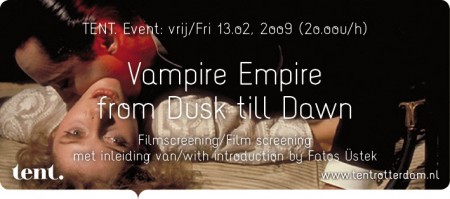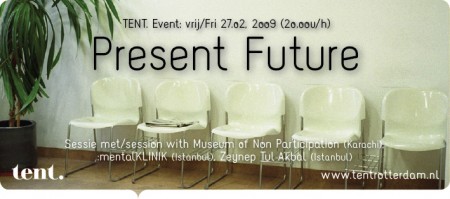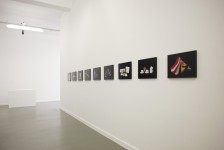//Part of NowExpanded Trilogy//
Project Archive: http://immortality-tentrotterdam.blogspot.com
22 Jan – 8 March 2009, Tent, Rotterdam
Artists: Carla Ahlander, Iddo Drevijn, Antje Peters, Bettina Pousttchi, Elian Somers
With: Karen Mirza & Brad Butler, :mentalklinik, Zeynep Tul Sualp Akbal
Immortality is often associated either with the soul, as that which is everlasting, or with the human body that decays in nature for all eternity after the death of its ‘subject’. This project deals with neither.
The immortality of the mind is composed through continuous production of the subjective truths. It is sustained through experiencing of participation in social domains, which unfolds being effective on and under influence of things, realisation of understandings and frameworks. The real is constructed through gathering of subjective truths in a collective consciousness.
‘Everyday’ hosts continuous production of definitions on how to relate to the other in various circumstances: work-related, friendship-related, and casual encounters. The patterns of repetition mostly designate the content of the interactions. That is to say, the way people are exercised in thinking, in being in the doing and making things effect how they connect themselves to the others and to their surrounding.
Today, we can talk about the normalisation of production because of the existence of a tendency to single out the variety of subjective truths. In other words, we can talk about tendencies of rigid control and a priori acceptances in the contemporary society of today. The aspects of ideology and fanaticism in relation to social discourses gain importance. In other words, the subjective truths are becoming around certain strong commonalities of understanding the world around us. It is the clash that fanaticism of any sort, resulting in segregation of ideas, societies and living.
The project looks on the definitions of ‘everyday’: How the everyday is influenced by fixed and enduring ideas. And how societies use these to create the rationale of their own existence. The exhibition displays the aesthetics of sustaining immortality, whereas the talk contextualises its relation to current socio-political states, or the film event is a bridging of a fantasy with real.
Exhibition:
Carla Åhlander shows a photo series depicting waiting rooms in the council offices in Berlin. Initially the rooms present themselves as neutral, the power is discreet. There are no people in the waiting rooms, only the possibility of their presence. In addition to the photo series she is showing a new work, Symbolic Capital. A line of people stand in the public space in front of the Employment Office in Berlin waiting for the office to open.
Iddo Drevijn graduated from the Willem de Kooning Academie in the summer of 2008 with a text piece and a series of performances. His wall text Your Mind is My Revolution is essentially an optimistic piece. We don’t know the subject, but it sets itself up as the protagonist of a change, and claims the mental legacy of an imaginary public in order to spark a revolution.
Antje Peters made the photo series Collection on commission for a publication on the house style of the Dutch ministries by Studio Dumbar. The photos show office material and promotional gifts with the logos of the various ministries and departments. In 2008 the State decided to adopt a single logo (designed by Studio Dumbar) and these identity bearers became redundant.
Bettina Pousttchi works with installations, video and photography. In the exhibition she is showing Whiteout, a sculpture made of crush barriers. The twisted steel standards could well be the result of a demonstration turned violent, but also have an elegance that puts their regulating function into perspective. The video piece Line (2005) is a registration of a protest march. The demonstration is peaceful, if only because the presence of police leads to the desired behaviour.
Urban utopias such as Brasilia, the Cité Modelé in Brussels and Kleipolder in Rotterdam are the subjects of recent photo series by Elian Somers. She is interested in the way in which the idea of progress that lay behind the construction of these residential areas becomes visible in photography. In her recent project on the city Kaliningrad, she examines the traces of the various ideologies that defined the history of the city.

Vampire Empire From Dusk Till Dawn
In the night dedicated to Vampires, the screening of three selected films started after the introduction on the relationship of vampires and the concept of the exhibition. Vampires are the undead, live on draining the other, belong to a high class in the society. In the presentation the historicity of vampires in relation to Blood Transaction Experiments in 19th century Russia is displayed. Vampires as social artefacts are bridged to the concept of immortality as a life strategy.
Film List:
Blood for Dracula (1973) by Paul Morrissey,
Nadja (1995) by Michael Almereyda,
The Lost Boys (1987) by Joel Schumacher.

Present Future
London-based film artists Karen Mirza and Brad Butler (http://www.mirza-butler.net/index.php?/1/news/) will present a performance. They recently initiated the Museum of Non Participation, which they are carrying out in Karachi, Pakistan commissioned by Artangel, London. In this project, they are working with Pakistani communities in Karachi and London to explore how violence inherent in political structures are played out in social spaces.
Istanbul-based artist duo :mentalKLINIK (http://www.mentalklinik.com/ ) will be speaking about their recent projects which deal with nanotechnology and virtual reality. One of the reasons why Yasemin Baydar and Birol Demir founded their collective :mentalKLINIK is to re-evaluate the human – object relationship and to attempt to prove that the relationship subject-object can be experienced differently in the future.
Zeynep Tul Sualp Akbal is working as a scientist at Bahcesehir University of Istanbul. Her publications on film and theory have had a profound impact on the country’s flourishing film industry. In her talk, she will question today’s subjectifying strategies through observations on sci-fi films and the dynamics of contemporary western society.









































